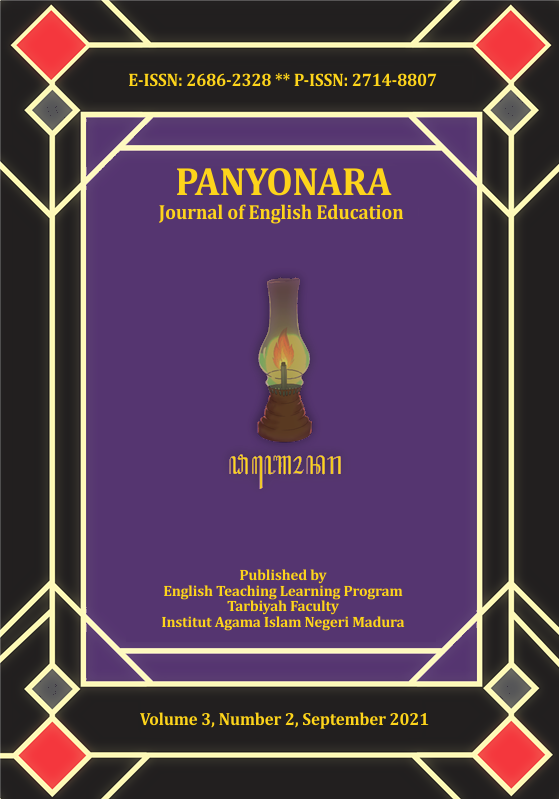An Analysis of Madurese Dialect in the English Conversation by the Members of Bata-Bata English Centre (BBEC)
 Abstract views: 570
,
Abstract views: 570
,
 PDF downloads: 517
PDF downloads: 517
Abstract
The concept of world Englishes refers to English as a global language that means communication in numerous dialects and the movement towards an international standard for English. Varieties of English are used in various sociolinguistic contexts in different parts of the world, also in Indonesia. Since English plays as a foreign language, sometimes Indonesians still use their dialect. This study was mainly purposed to describe Madurese dialect in the English conversation made by Bata-Bata English Centre (BBEC). Mainly, this research is aimed to (1) Describe the patterns of Madurese dialect in English conversation by the members of the Bata-Bata English Centre (BBEC). (2) Know the factors that affect the pattern of Madurese dialect in the English conversation by the Bata-Bata English Centre (BBEC). This research belongs to qualitative research which investigates the group of BBEC about Madurese dialect in their English conversation. The researcher observed the students' learning process, interviewed them and took notes, recordings, and pictures. The study results were that the researcher found the patterns of Madurese dialect occur in the English conversation in three features: pronunciation which caused sound changing, a grammatical pattern that caused incorrect grammar; and inappropriate vocabulary. Second, the researcher found that three factors affected how their dialect in the English conversation. The first is lack of speech, Madurese language influences second, and the last factor is never listening to native English speakers. Madurese language that plays as their mother tongue influences their dialect in the English conversation
Downloads
References
Azror, C. (2016). Englsh Speaking Dialect Used by Madurese Students of SMPN 1 Klampis in Bangkalan Madura. Thesis, Universtas Islam Negeri Sunan Ampel Surabaya.
Baker, W., Eddington, D., & Nay, L. (2007). Dialect Identification: The Effect of Region of Origin and Amount of Experience. American Speech 84(1). https://doi.org/DOI: 10.1215/00031283-2009-004
Bright, W. (2007). Social Factor in Language Change. Blackwell Reference Online. https://doi.org/10.1111/b.9780631211938.1998.0007.x
Clopper, C. G., & Smilijanic, R. (2011). Effects of Gender and Regional Dialect on Prosodic Patterns in American English. Journal of Phonetics, 39(2). 237-245. doi:10.1016/j.wocn.2011.02.006
Eastwood, J. (2008). Oxford Learner’s Pocket Grammar. Oxford: Oxford University Press.
Fasold, R. W., & Connor-Linton, J. (2006). An Introduction to Language and Linguistics. Cambridge: Cambridge University Press.
Fromkin, V., Rodman, R., & Hyams, N. (2003). An Introduction to Language. Boston: Wadsworth Cengage Learning.
Gilakjani, A. P., & Sabouri, N. (2016). The Significance of Listening Comprehension in English Language Teaching. Theory and Practice in Language Studies.6(8) https://doi.org/10.17507/tpls.0608.22
Hidayati, D., & Thayyibah, N. (2020, Agustus). Madurese Dialect of Members of BBEC [Direct Interview].
Holmes, J. (2013). An Introduction to Sociolinguistics (4th ed.). London: Routledge.
Isiaka, A. L. (2021). Accommodation in L2 English: Measuring dialect Convergence in Nigerian Englishes. Language & Communication, 79, 71–80. doi: 10.1016/j.langcom.2021.03.002
Jannedy, S., Poletto, R., & Weldon, T. L. (Eds.). (1994). Language Files Materials for an Introduction to Language & Linguistics (sixth). Ohio State University Press.
Mantiri, O. (2010). Factors Affecting Language Change (SSRN Scholarly Paper No. ID 2566128). Rochester, NY: Social Science Research Network. doi: 10.2139/ssrn.2566128
Nordquist, R. (2019). The “Expanding Circle” of English-Speaking Countries. Retrieved September 24, 2021, from ThoughtCo website: https://www.thoughtco.com/expanding-circle-english-language-1690619.
R Umagandhi & R Sindhuja. (2017). Socio-Linguistics and Language Variation. International Journal of Multidisciplinary Research and Development, 4(11), 107–108.
Rohmatillah, R. (2014). A Study on Students’ Difficulties In Learning Vocabulary. English Education: Jurnal Tadris Bahasa Inggris, 6(1), 75–93. doi: 10.24042/ee-jtbi.v6i1.520
Sa’adiyah, E. N., Rezti, D., & Mufidah, L. (2017). The Influence of Madurese L1 Background on The Student’s English Consonantal Sounds Production. INTERAKSI : Jurnal Kependidikan, 12(2), 129–133.
Salano-Flores, G. (2006). Language, Dialect, and Register: Sociolinguistics and the estimation of Measurement Error in the Testing of English Language Learners. 108.
Shams, T. (2018). Language Variation. https://languageavenue.com/linguistics/sociolinguistics/language-variation/item/language-variation
Siregar, S. (2017). The Influence of Dialect on The Student’s Pronunciation in Speaking Ability. Pedagogy : Journal of English Language Teaching, 5(1), 27–36. doi: 10.32332/pedagogy.v5i1.766
Wardhaugh, R. (2006). An Introduction to Sociolinguistics (5th ed.). Boston: Blackwell Publishing.
Wolfram, W., & Friday, W. C. (1997). The Role of Dialect Differences in Cross-cultural Communication: Proactive Dialect Awareness. Bulletin Suisse de Linguistique Appliquee, 65, 143-154
The journal uses an Open Access policy under a Creative Commons Attribution-NonCommercial 4.0 International License. Authors who publish with this journal agree to the following terms:
- Authors retain copyright and grant the journal right of first publication with the work simultaneously licensed under a Creative Commons Attribution License that allows others to share the work with an acknowledgment of the work's authorship and initial publication in this journal.
- Authors are able to enter into separate, additional contractual arrangements for the non-exclusive distribution of the journal's published version of the work (e.g., post it to an institutional repository or publish it in a book), with an acknowledgment of its initial publication in this journal.
- Authors are permitted and encouraged to post their work online (e.g., in institutional repositories or on their website) prior to and during the submission process, as it can lead to productive exchanges, as well as earlier and greater citation of published work.
















